The queen of bailanta : The Picture Show : NPR
Melissa Lobos, the lead singer for the dissident band Cachitas Now!, performs at Ciudad de Gatos bar in La Plata, Argentina, on July 28, 2024. Karla Gachet hide caption toggle caption Karla Gachet This is part of a special series, Cumbia Across Latin America, a visual report across six countries covering the people, places and…

Melissa Lobos, the lead singer for the dissident band Cachitas Now!, performs at Ciudad de Gatos bar in La Plata, Argentina, on July 28, 2024.
Karla Gachet
hide caption
toggle caption
Karla Gachet
This is part of a special series, Cumbia Across Latin America, a visual report across six countries covering the people, places and cultures that keep this music genre alive.
Luciano Rombolá, host of the radio and digital program Cumbia de la Pura, calls Argentine cumbia “the tropical music of the end of the world.” He also says that the history of this cumbia phenomenon cannot be analyzed without considering migration. Around the 1950s, the University of Buenos Aires welcomed foreign migrants, who could study for free. This attracted many music students, one of them Costa Rican Mario Castellón, who formed a group with two Colombians, a Peruvian and a Chilean to entertain at a wedding. Thus, Los Wawancó was born — one of Argentina’s most iconic and foundational cumbia bands.

A party before a soccer match at the stadium La Bombonerita in Buenos Aires’ La Boca barrio on Aug. 4, 2024.
Karla Gachet
hide caption
toggle caption
Karla Gachet

The cumbia band Los Seniors perform at a birthday party for a Bolivian family in Gregorio de Laferrère, a city outside Buenos Aires, Argentina, on Aug. 2, 2024.
Karla Gachet
hide caption
toggle caption
Karla Gachet
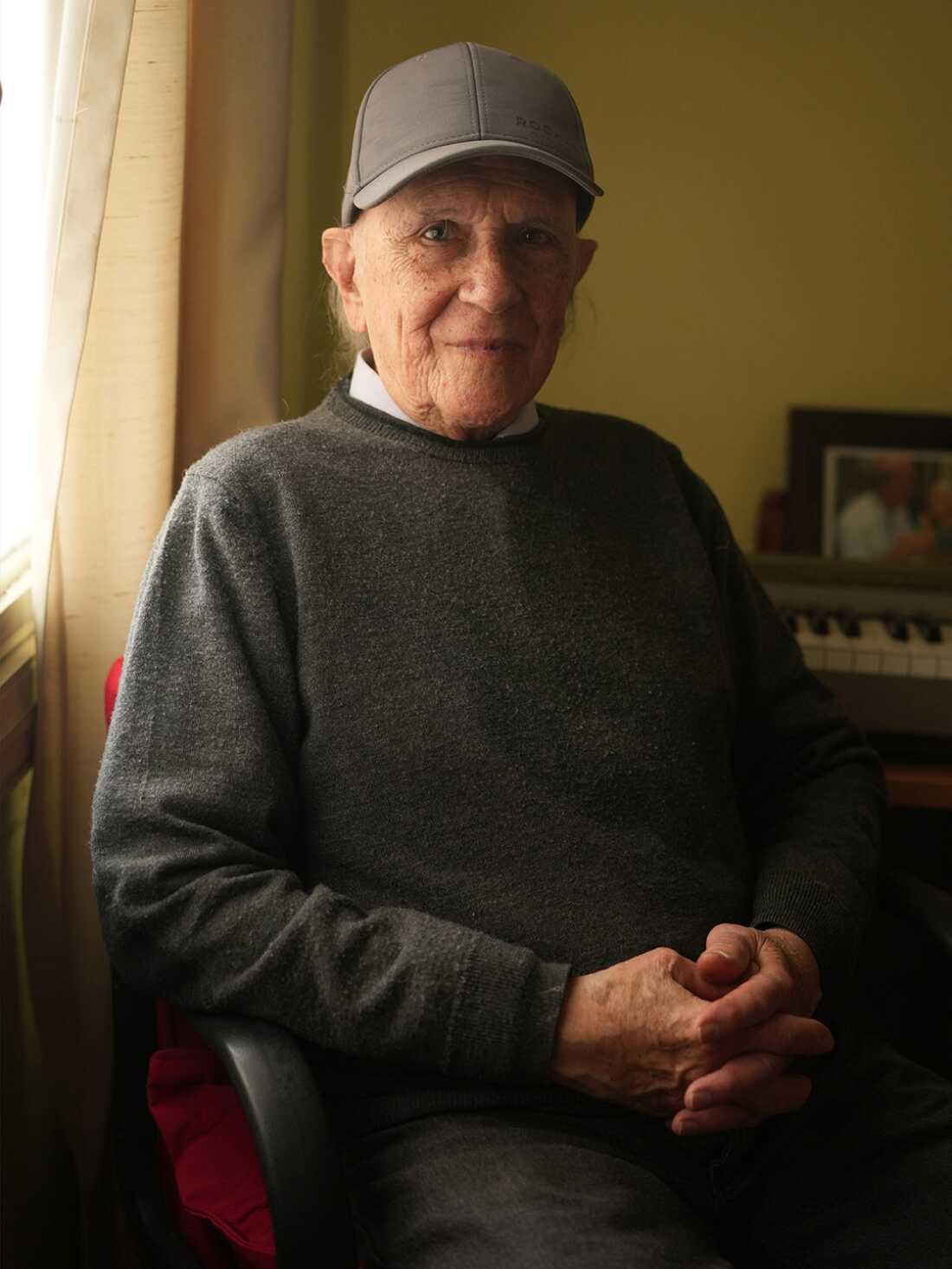
Pianist Miguel Loubet, the last surviving member of Los Wawancó, poses for a portrait on Aug. 1, 2024.
Karla Gachet
hide caption
toggle caption
Karla Gachet
Over the years, other influences have come to Argentine cumbia, including — but not limited to — chicha and huayno tropical from Bolivia, cachaca from Paraguay, cumbia chicheras, chacaloneras and norteñas from Peru and, of course, Colombian cumbia.
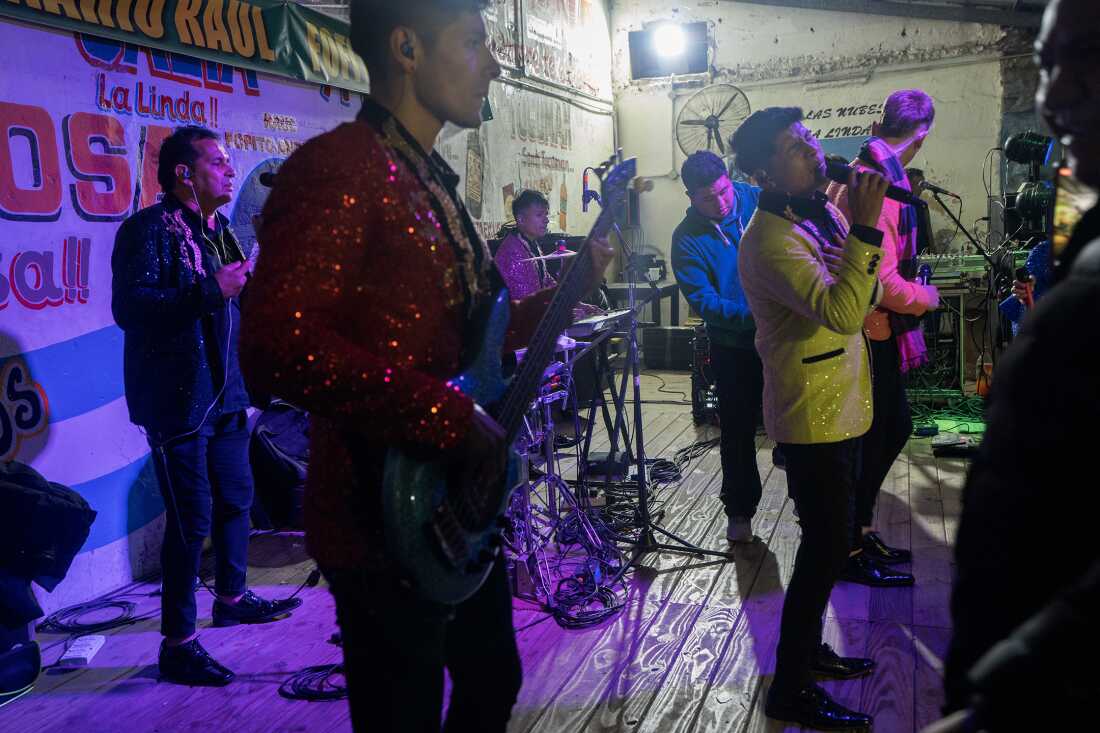
The band Bandy2 performs at La Peña de Mario Ibarra in Buenos Aires’ La Boca barrio on July 28, 2024. The place is filled with lovers of northern cumbia.
Karla Gachet
hide caption
toggle caption
Karla Gachet

People gather at La Peña de Mario Ibarra in the La Boca neighborhood of Buenos Aires to celebrate Pachamama Day on Aug. 1, 2024. Members of the Bolivian, Salta and Jujuy communities take part in the traditional Andean ceremony honoring Mother Earth.
Karla Gachet
hide caption
toggle caption
Karla Gachet
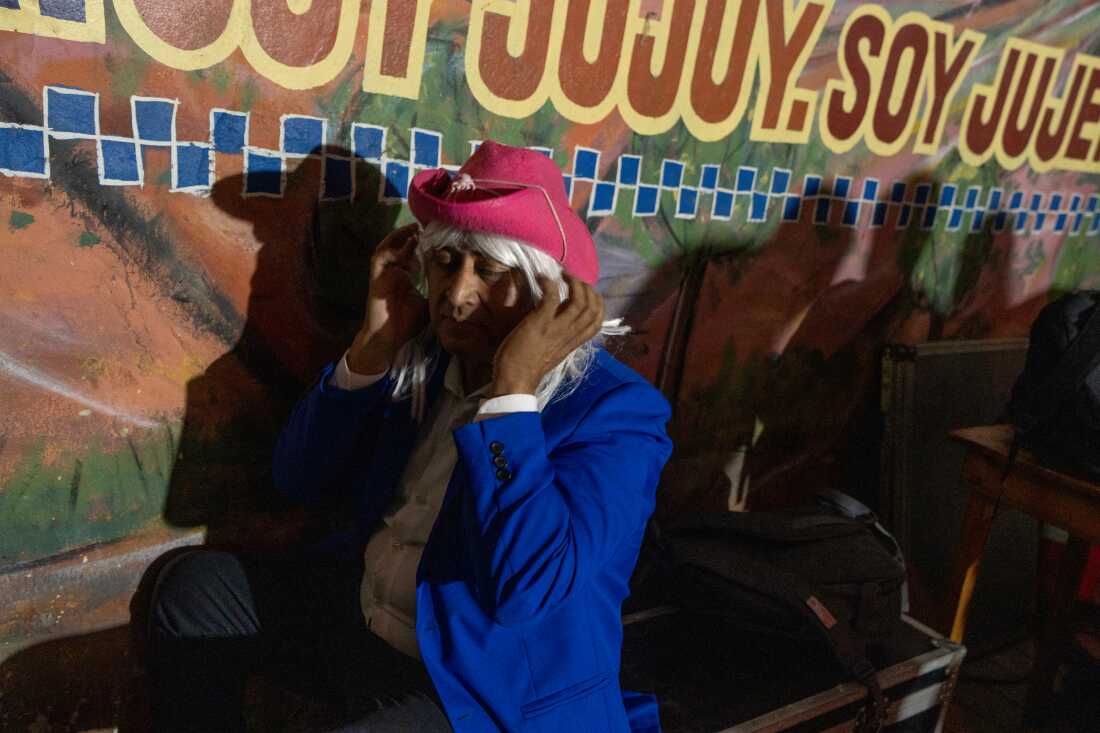
Martin Oropeza, the crowd entertainer for the band Sabor Karpero, gets ready for a performance at the Peña de Mario Ibarra in Buenos Aires’ La Boca barrio on July 28, 2024.
Karla Gachet
hide caption
toggle caption
Karla Gachet

People gather for a street party in Buenos Aires’ La Boca barrio before a soccer match at the La Bombonerita stadium on July 31, 2024. Pre-game celebrations take place throughout the area, with cumbia bands often hired to perform outside food and drink establishments.
Karla Gachet
hide caption
toggle caption
Karla Gachet
During the military dictatorship that ruled Argentina from 1976 until 1983, many people migrated to the capital in search of better opportunities. This is how the Greater Buenos Aires area was populated, a kind of buffer zone between Buenos Aires and the rest of Argentina where migrants from other regions and countries found affordable housing. With the return of democracy in the ’80s, dance clubs opened where communities and their musical groups had their own space. Many of these venues are called “bailantas,” originally a pejorative term because these dance halls were historically associated with working-class and marginalized communities of lower social status. However, the term has since been reappropriated by cumbia communities. Cumbia has also been called “black” music because it has historically been consumed by the working class and migrants.

A view of Maciel Island, a neighborhood in Dock Sud, a town just outside Buenos Aires, on Aug. 3, 2024. Cumbia groups from Santa Fe first performed here outside their province, helping popularize “cumbia santafesina,” a blend of traditional cumbia featuring accordion and guitar.
Karla Gachet
hide caption
toggle caption
Karla Gachet

Adrián and Deborah Chauque pose for a portrait at their home in Buenos Aires on Aug. 2, 2024. Adrián is the frontman of Adrián y los Dados Negros, a 1980s cumbia band that continues to perform in Argentina and Bolivia.
Karla Gachet
hide caption
toggle caption
Karla Gachet
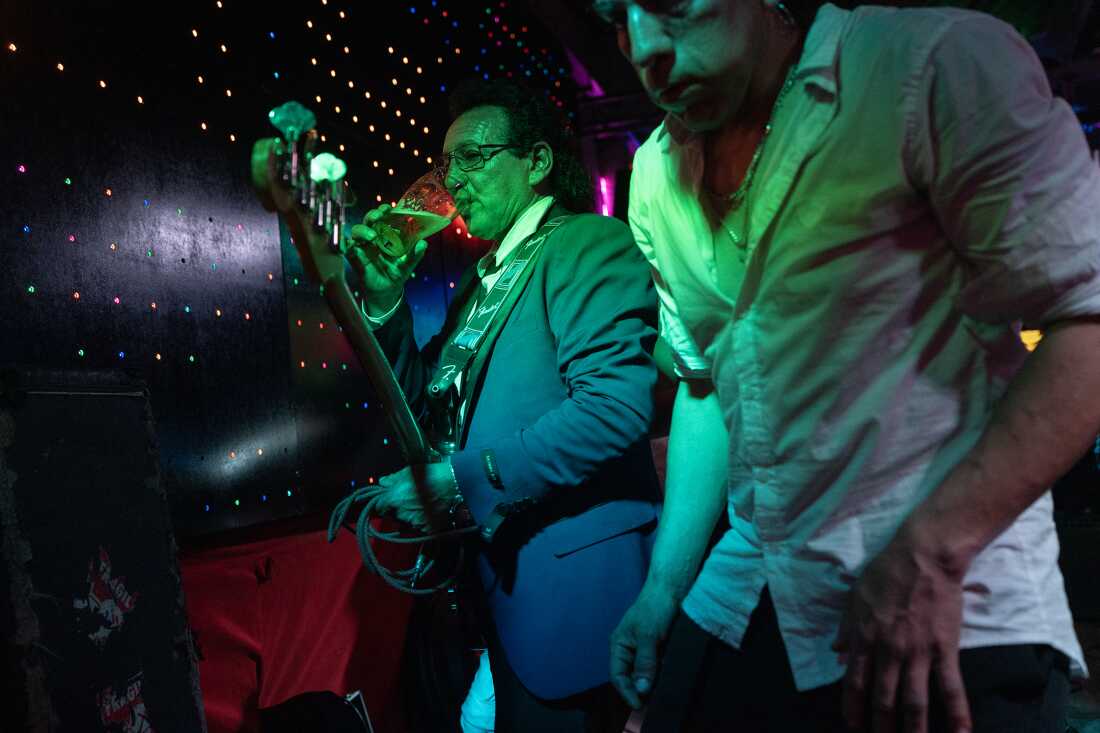
Adrián Chauque y los Dados Negros perform at El Maza bar in Buenos Aires, Argentina, on Aug. 2, 2024.
Karla Gachet
hide caption
toggle caption
Karla Gachet

Adrián Chauque is hugged by a fan in El Maza bar in Buenos Aires, Argentina, on Aug. 2, 2024.
Karla Gachet
hide caption
toggle caption
Karla Gachet

Adrián Chauque y los Dados Negros perform at a bar in Buenos Aires, Argentina, on Aug. 2, 2024.
Karla Gachet
hide caption
toggle caption
Karla Gachet
As Argentina’s demographics evolved, so has its cumbia, becoming a reflection of the diverse voices and experiences that shape the nation today. While Adrián Chauque and Los Dados Negros liven up parties for Bolivians and migrants from northern Argentina at a suburban dance hall, Rocío Quiroz sings her cumbia villera on Pasión de Sábado, and Cachitas Now!, a dissident band, sings to a university-aged queer audience in La Plata. Chauque sings the cumbias of old, those of love and heartbreak. Quiroz does too, but with a more street-oriented tone, and Cachitas Now!, tired of the misogynistic lyrics of many cumbias, decided to put their stamp on it and make the rhythm their own. Melissa Lobos, Cachitas Now!’s vocalist, says that cumbia “belongs to everyone! We shouldn’t be oblivious to the context we’re in; we can’t have such rigid ideas — cumbia is this and not that. For me, a good cumbia is one that makes me dance or one that has a chorus that makes me sing it out loud.”

Zoe Ailín Banari, Sol Aguirre and Tiara Florencia Banari, fans of Rocío Quiroz, pose for a portrait outside the studio where the TV show Pasión de Sábado is filmed in Buenos Aires on July 27, 2024. Quiroz is a regular guest on the show.
Karla Gachet
hide caption
toggle caption
Karla Gachet
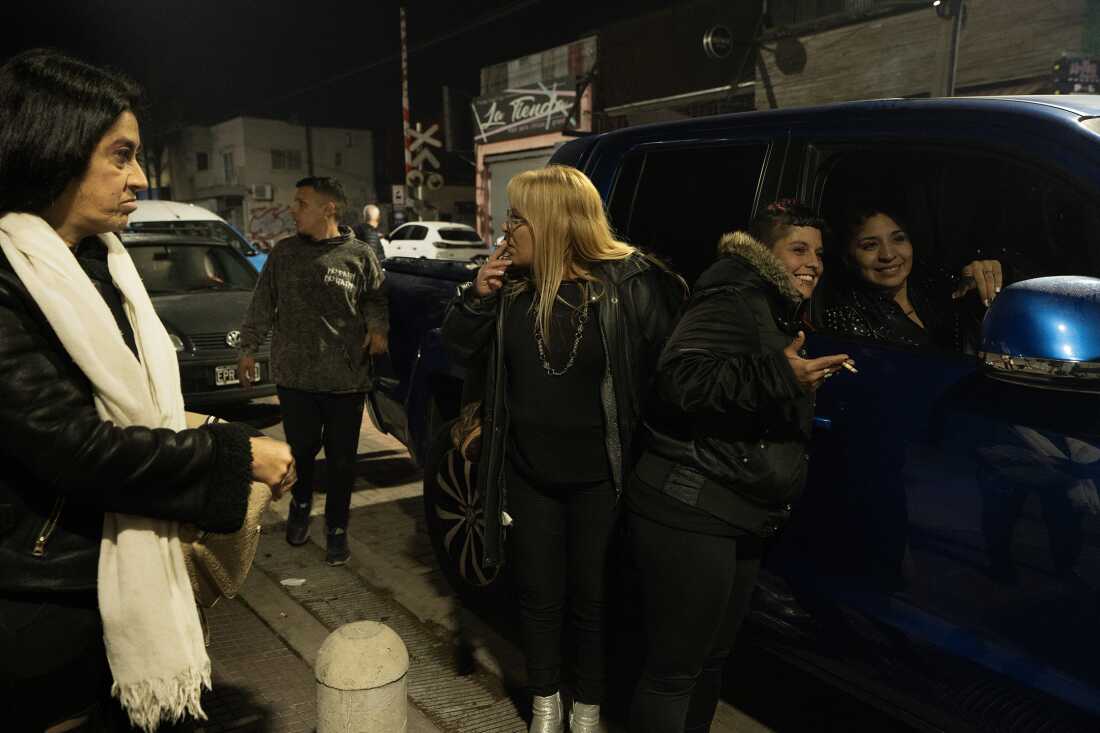
Fans of Rocío Quiroz, a popular cumbia villera singer, gather to ask for her autograph as she leaves a concert on July 27, 2024. The show took place in the Conurbano, a suburban area surrounding Buenos Aires where many migrant communities live.
Karla Gachet
hide caption
toggle caption
Karla Gachet

Gisela Ressia poses for a portrait at her home near Buenos Aires, Argentina, on Aug. 5, 2024. Ressia pays tribute to the late Gilda, a 1990s cumbia singer who died in a car accident.
Karla Gachet
hide caption
toggle caption
Karla Gachet

Gilda, pictured here on a fan’s T-shirt, became a pagan saint to her followers and an icon of Argentine cumbia.
Karla Gachet
hide caption
toggle caption
Karla Gachet
The one thing almost all Argentinians from all social and cultural backgrounds agree on is Gilda. As a kindergarten teacher, she decided to launch into singing despite not having the voluptuous body of other artists of her time. Gilda touched people’s hearts through her voice, her compositions and the stories told by her fans, who attributed miracles to her. At that time, in the 1990s, she was already speaking about gender perspective, following your dreams and flying high. Like many of her cumbia colleagues who have died on the road while rushing from one event to another, Gilda died in a traffic accident and became the saint of the dance. Gilda is a symbol of freedom, and her songs continue to be performed throughout the continent.
This coverage was made with the support of the National Geographic Society Explorer program.
Karla Gachet is a photojournalist based in Los Angeles. You can see more of Karla’s work on her website, KarlaGachet.com, or on Instagram at @kchete77.

